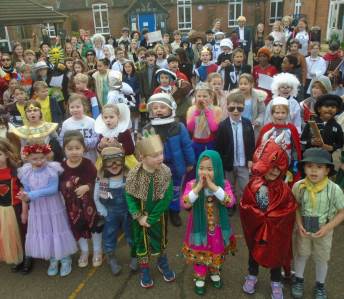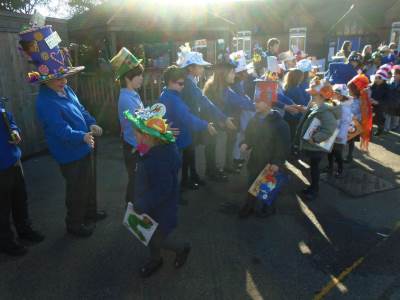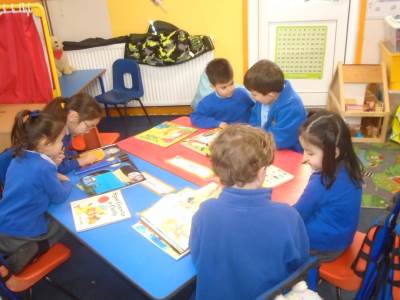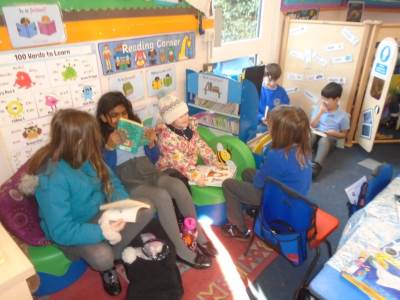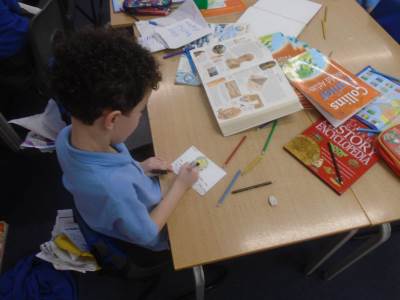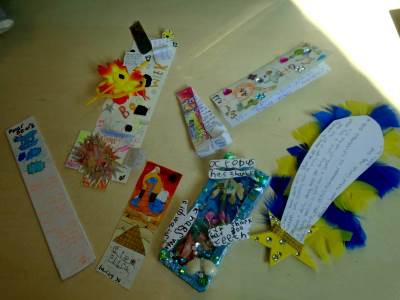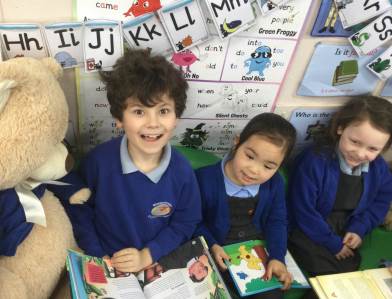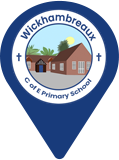Phonics and Reading

Reading across Wickhambreaux CEPS
As the Jane Austen quotation on the back of the £10 note says
”I declare after all there is no enjoyment like reading!”
….and so we heartily agree. Wickhambreaux School is a community of readers and we often share what we are currently reading with each other; even the staff have signs up telling others of what they’re reading at the moment. It’s a great way to get a recommendation for that next amazing reading experience!
The teaching of reading is taken very seriously at Wickhambreaux. In both EYFS and Years 1&2, all children are taught systematically by using the systematic synthetic phonics programme, Monster Phonics. Once in KS1, all children begin to be regularly bench-marked to check that they are reading books at the appropriate level of challenge for their reading abilities at that particular time. Book stocks within school are organised to ensure they meet the reading needs of the children in all the classes.
Asides from the quality-first teaching of reading in each class, whether it is through daily guided reading lessons or more focused small-group reading support sessions, the school also provides following individualised reading programmes:
-
The school has formerly been accredited as a Reading Recovery School and has a Specialist Reading Teacher who has been trained and experienced in teaching Reading Recovery for over 10 years. The school now supports pupils with difficulties in reading by following a bespoke intervention of Specialised Literacy Lessons (SLL) which integrates specific synthetic phonics teaching to provide individualised literacy lessons that work from each child’s strengths to help them progress onto learning new skills and strategies helping them increase their reading abilities to catch up with their year group peers at an accelerated rate. These one to one lessons are usually carried out with children in Year 1, who have found it difficult to make progress in reading and writing after their first year at school.
-
Alongside this intensive reading support, the school also offers the Better Reading Partnership (BRP) which is a ‘lighter touch’ version of the above intervention programme approach and is delivered by specially trained volunteer adults, whilst being closely managed by the school’s English Subject Lead/Reading Manager (who is also a qualified and experienced trainer for BRP). This programme is available for all ages of pupils who may just need a boost with their reading skills.
-
The English subject Lead/School Reading Manager also carries out a range of literacy based assessments with children in KS2 who are finding it difficult to make progress in reading and writing at the same pace as their peers. These assessments help to pinpoint the areas of support that each pupil requires to make better progress and the outcomes are used to design and deliver one to one, individualised literacy lessons to meet each child’s specific needs.
-
Some children make excellent progress in using their phonic skills to read different texts, however they can meet difficulties in accessing the message and meaning behind the text they are able to read. The English Subject Lead/School Reading Manager runs a programme for a small group of pupils at a time, which provides additional structured practice of ‘digging deeper’ into the meaning that one reads. This programme is called Inference Training and does indeed ‘train’ the pupils in skills that help them read more critically and with greater levels of understanding.
-
For Y6 children whose reading skills are at an advanced level, a Literature Circle is run, to extend their higher order reading skills further, with teaching more in-line with the KS3 teaching they will receive in Year 7 and beyond. The focus here is upon developing a more critical approach towards the interpretation of a text with an emphasis upon developing one’s opinions and viewpoints that can be justified with textual evidence.

However it’s not all ‘reading skills and strategies’ at Wickhambreaux School! There is a lot of focus upon the joy and pleasure of reading. Within each classroom we allow time and space on the regular timetables for the children to informally discuss texts with each other and for teachers to promote texts to the children. Recent research (The Reading Framework; DfE; 2023 + T Cremin et al; OU; 2023/4) has highlighted the importance of casual interactions about reading and books to encourage children to opt to read, rather than just seeing it as a chore. It is always a joy to witness these conversations and to have the children strike them up with us, the staff, at any given moment!
Reading, the love of books and the written and spoken word are the bedrock of learning here. Children in Reception are taught the importance of listening as part of the art of good conversation. Pupils in key stage 2 share opinions enthusiastically about their likes and dislikes about books. They know their opinions are valid and valued. Those who struggle to read fluently are supported well by expert staff on their journey to become confident readers. Ofsted 2025
Alongside this we have frequent and regular celebrations and events geared towards the range of fun and enjoyment that can be derived from simply opening up a book. We regularly celebrate Children’s Book Week, World Book Day, National Poetry Day and Kickback and Read days, as well as numerous occasions throughout the year where texts are discussed, shared, reviewed and highlighted for others to enjoy. We are also keenly aware that reading is the key that can open the doors to many experiences, reflections, viewpoints and explanations, both within school and way beyond.
So we fully uphold Jane Austen’s proclamation that there is no enjoyment like reading!
What Reading looks like at Wickhambreaux
Vision Statement
At Wickhambreaux CEPS our aim is that our teaching of reading ensures all pupils learn to read fluently as quickly as possible. This is imperative as fluent readers will inevitably learn more, through being able to read and gain knowledge for themselves alongside the consistent guidance provided by the high quality first teaching of reading based skills throughout their time at this school. What is equally imperative is that Wickhambreaux pupils gain and continue to develop an intense love of reading whilst at this school. We seek to enable these aims by providing direct and focused daily teaching of systematic and synthetic phonics in Reception and KS1, whilst guiding pupils to read from books with complementary phonemes that they have mastered to consolidate their learning of reading. Supporting this quality-first teaching, there will be provision of extra practice for those pupils making slower progress. From Year 3 onwards all children will be reading age-appropriate texts and from the very beginning of our reading tutelage our teachers and other staff will be supporting and working to instil a love of literature, for as Michael Morpurgo has stated,
“Reading for Pleasure is a fundamental human right.”
(Jan 16th 2009; The Times)
Our teaching of reading will strive to not only instruct in the skills of reading and comprehension, but also staff will endeavour to develop their own knowledge of children’s literature and the nature of reading, particularly in relation to our young readers to ensure a robust reading for pleasure pedagogy within the school. This will be a constant multi-layered approach throughout each pupil’s experience of reading throughout the school, whether through daily guided reading lessons, one to one interventions, independent reading opportunities, informal book talk or shared/paired reading with other pupils in the school. This will be enhanced by frequent and regular opportunities throughout the school year for pupils to explore the wider and deeper enrichments that literature has to offer. For example, via, Book Week, author visits, Reading Challenges, Poetry Appreciation Celebrations, Reading Lounge Events, encouragement of parental involvement and many other related and creative events.
Within this language and literature rich environment, the pupils will receive direct teaching of poetry and performance; inference and prediction skills; recognising and understanding authorial intent; clarifying etymological knowledge and developing vocabulary; skills conducive to discussion of literature. Alongside this will be the continual provision of opportunities to widen their range of reading materials and expand their familiarity with a broad variety of texts and text types.
Our ultimate aim is that through the rock-solid teaching of foundation reading skills such as direct and focused synthetic phonics supported by contextual cues and grammatical agreement and the nurturing of the pleasures of reading, our pupils will move onwards and upwards in education and beyond to utilise this strong grounding to grow into inquisitive and reflective members of society. Our pupils will be encouraged to nurture a respectful understanding and tolerance of the different viewpoints of others, whilst still being fully able to confidently formulate their own viewpoints along with clear justifications for these.
Subject Documents
Curriculum Maps - Phonics Progression
At Wickhambreaux CEPS we teach phonics using the Monster Phonics Systematic Synthetic Phonics Programme (monsterphonics.com).
Curriculum Maps - Reading
- EYFS Eng Reading Curriculum Map
- Y1 Eng-Reading Curriculum Map 3 9 24
- Y2 Eng-Reading Curriculum Map 18 9 24
- Y3 4 Eng-Reading Curriculum Map 18 9 24
- Y5 6 Eng-Reading Curriculum Map 24 9 24
English vocabulary overviews
Please see class pages for overviews of key vocabulary for each Key Stage.





